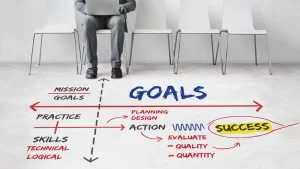A feeling of being stuck happens to all of us at some time in life – be it in our career or other aspects of life.
I started my coaching with a sense of being stuck in my current job and life in general. Gowri provided me with several guiding frameworks and a series of incisive questions that “forced” me to find time and focus to answer them. This helped me break the cycle, embrace the limits of my knowledge, and replace my overthinking and lack of confidence with bias for action. I made a few major leaps in the past six months, and I feel better equipped for future challenges.
The above comment from a client, who grew wings and liberated themselves from self-limiting thoughts and beliefs after a coaching partnership is heartwarming!
So, why does one feel stuck at work?
There can be many external, visible factors like:
- Not growing or stagnating (work content, pay, designation) can lead to a sense of being stuck
- Limiting Opportunities: Unable to showcase one’s strengths or interests or not getting support for one’s ideas
- Limited Opportunities: Few options to change or evolve within workplace
- Fear of Change: Uncertainty or fear about making a career change
- External Factors: Economic conditions, company instability, or industry changes
There can, however, be internal factors based on your beliefs, state of mind and attitude that can exacerbate the sense of stuck-ness:
– when you lose sight of your strengths and the value you bring to the organization; e.g., I don’t think what I do is important to the organization.
– feeling of guilt or shame on not having all the answers; e.g., I should know the answers to help the team keep moving forward.
– when you are unable to make choices waiting for the perfect moment or opportunity and overthinking decisions; e.g., for everything I know, there’s more I don’t know, so how do I decide
– when you start seeing even positive from a negative perspective; e.g., I am being given work that nobody wants to do or I am not good enough to get meaningful work
It becomes impossible to work on external factors unless you deal with the internal chatter to get over what is holding you back.
Reframing the beliefs can have a huge impact on changing the state of mind and hence enable working on the external factors:
– Every choice made is for all eternity! No, choices can be corrected or refined as more information becomes available
– Making a wrong decision can lead to irreversible costs! Be comfortable with the imperfections, make progress on the information available Have the confidence that you can deal with what emerges
– A person with one watch knows the time, a person with two watches is never sure! Simplify decisions by eliminating options that don’t matter.
– The work I do, while it may not be shiny, is critical without which others’ pieces can’t progress! Recognize and understand where the work you do fits in the big picture!
This client was able to reflect inwards, recognize and name the blockers with honesty and courage to be able to make major transformational decisions regarding his work, personal life and create new possibilities for themselves.
What are some of the blockers you have encountered? Do share your experience in Comments.
This was first published on LinkedIn.







